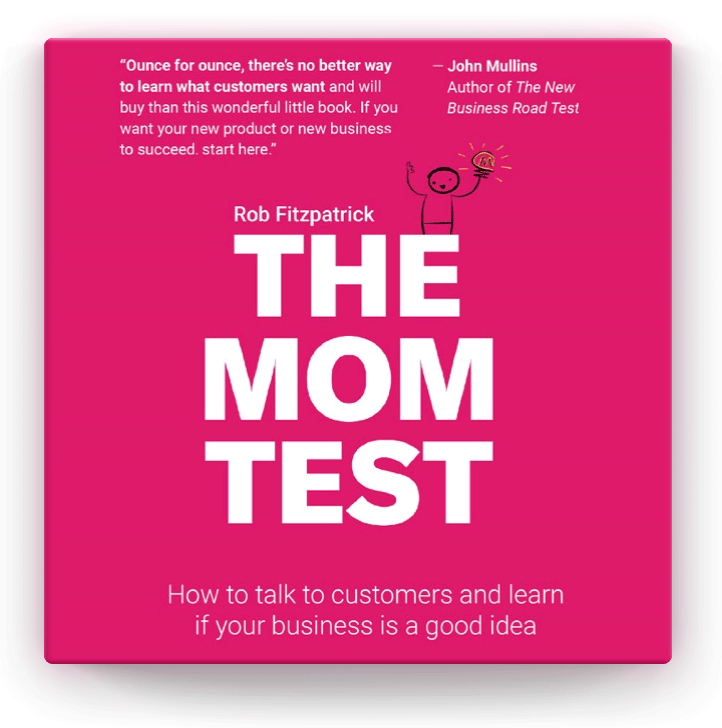The Mom Test – Rob Fitzpatrick
The goal of this series of posts is not to provide the summary of the book. The goal is to save ideas for myself for later reflections or use.
As I said I've happened to launch several pet projects without proper research, which led to them being not successful among potential users. The reason behind that is believing that solving your (=my) pain will be solving other's. Although this might be true for some cases, it turns out to be false judgement for the majority.
The main mistake everyone (including myself) keep making is being sure the idea is worthy of being tested. The very first and the single most important step you need to take is conduct user interviews. That's exactly the topic 'The Mom Test' covers.
Book rating: 8/10

Audience
Should you be working on a project of your own, planning to launch something or just have an idea you want to test out – this book is for you. You will receive the foundational understanding of what needs to be done before any idea gets into production / validation / testing phase – and what will separate you from the rest.
What will you learn?
The main takeaway from this book is you have to ask the right questions to your prospective clients and be ready to receive unpleasant responses. The goal you have in mind is building something that is truly valuable to your customers and that makes their lives better.
The book provides a great example of an interview that you would usually conduct with your mom: you would ask questions that you expect to receive pleasant answers to ('Do you like this idea? Would you use it?') and your mom would provide answers you would like to hear because she loves you so much ('Yeah, that's amazing! Of course I would! It costs \$40? I would do it anyway!')
Actionable items & Learnings
Questions you ask should cover the lives of your clients: their problems, worries, goals and limitations.
You should not be talking about what you think the potential client's problem is and they should not be telling you what product to make. Problem lays on their side, solution is on yours.
You already know how to react to compliments: avoid, ignore, come back to the main topic.
This struck me as really interesting, since your natural desire is to actually enjoy the compliments and praises you receive as you think they validate your idea. Not quite.
The only thing people talk about with greater interest than themselves is their problems.
Love this. It made me believe I can get a lot of insights from potential users just by asking them about their pains and problems. Definitely a thing to be remembered.
Vision / Framing / Weakness / Pedestal / Ask (Very Few Wizards Properly Ask for help)
- Vision: You’re an entrepreneur trying to solve horrible problem X, usher in wonderful vision Y or fix stagnant industry Z. Don’t mention your idea.
- Framing: Frame expectations by mentioning what stage you’re at, and if it’s true, that you don’t have anything to sell.
- Weakness: Show weakness and give them the chance to help by mentioning the specific problem you’re looking for answers on. This will help clarify that you’re not a time waster.
- Pedestal: Put them on a pedestal by showing how much they, in particular, can help.
- Ask: Explicitly ask for help.
Great way of framing the meeting to have the best possible outcome.
Overall there is an extensive list of things to remember before / in the process / after the interview in the end of the book which you can refer to anytime.
Some high-level thoughts and notes:
- You will inevitably make mistakes, be ok with them and keep trying more and more
- Be ready for the negative feedback, make yourself comfortable with it since it's still a process of learning
- Start a blog where you share your findings and knowledge
- Be aware of compliments and defer them as much as you can
- Interviews might save you a fortune (both money and time) so make sure you actually carry them out
- It's going to be great, believe in yourself!
